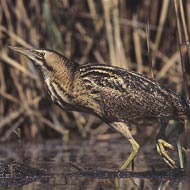
Largest number recorded for 200 years
A threatened type of heron, known as the bittern, has seen a very welcome revival in the UK, pulling it back from the brink of a second extinction.
Over 150 male bitterns were recorded in England and Wales this year, according to the RSPB. This is thought to be the largest number for more than 200 years.
Scientists record the number of birds by listening for the male bittern's booming song, which sounds like a foghorn.
The bittern was extinct in the UK at the turn of the 20th century and did not return as a breeding bird until 1911. Conservationists feared a second UK extinction when numbers plummeted to just 11 booming males in England in the late 1990s.
Over the past 25 years, there have been several significant projects to improve and restore the species preferred habitat of wet reedbed, which had become scarce and under managed.
Martin Harper, the RSPB’s conservation director, said: “The bittern is a species which proves that conservation can be successful, especially when you can identify the reason behind its decline and bring in measures and funding to aid its recovery.”
According to the RSPB's latest figures, more than half the recorded booming males are on sites protected by international laws which may be under threat. Mr Harper warned that a consultation on the future of the European Union's Birds and Habitats Directives could lead to a weakening of the law, with "potentially disastrous consequences for many threatened species."
Image attribution: Marek Szczepanek/Wikipedia/CC BY 3.0



 The British Equine Veterinary Association (BEVA) is to allow its registered veterinary nurse (RVN) members the right to vote.
The British Equine Veterinary Association (BEVA) is to allow its registered veterinary nurse (RVN) members the right to vote.